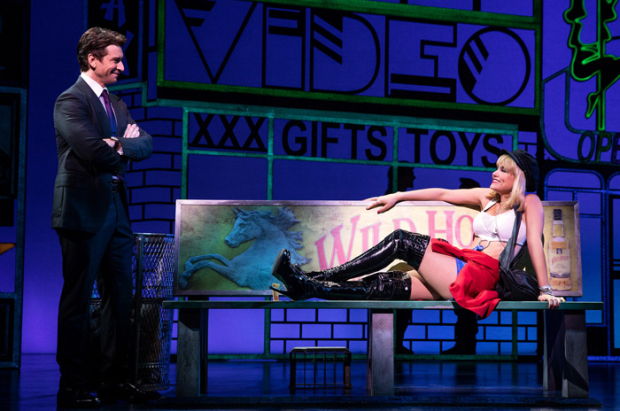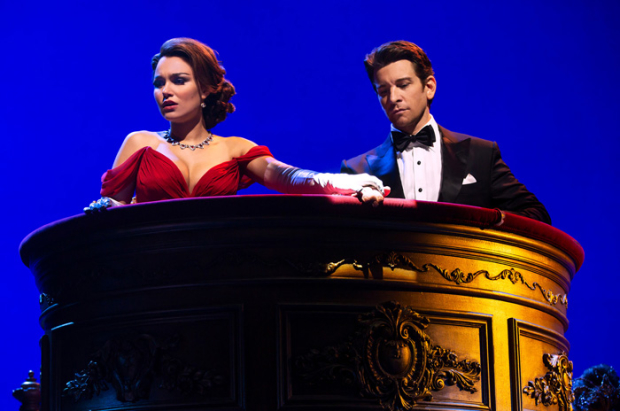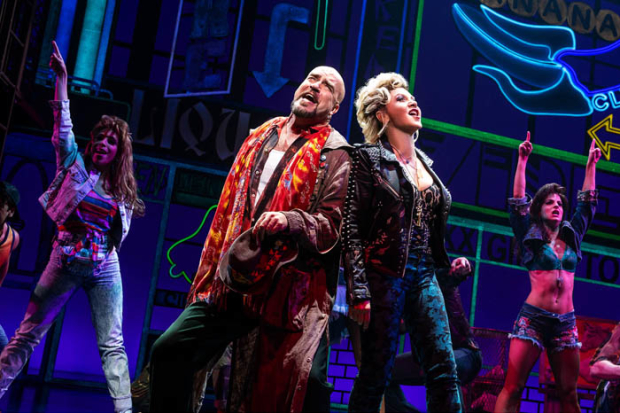Pretty Woman Brings the Fairy Tale of Hollywood Boulevard to Broadway

(© Matthew Murphy)
Yes, Pretty Woman is a story about a billionaire who falls in love with a prostitute, thus rescuing her from the mean sidewalks of Hollywood Boulevard. But she rescues him right back!
A movie of its time (the early '90s), that catchall defense has allowed us to delight in the unlikely romance of Vivian Ward and Edward Lewis (famously played by Julia Roberts and Richard Gere) while suspending our objections to its tangled mess of sexual politics. But the Broadway musical, a modern creation that opened this evening at the Nederlander Theatre, has to pass the 2018 smell test of #MeToo and #TimesUp.
On that front, there's good news and bad news for Pretty Woman, which now stars Samantha Barks (in her Broadway debut) and Andy Karl as our romantic leads. The good is that J.F. Lawton's stage adaptation of his screenplay isn't likely to change your taste for the story one way or another. The bad is that Lawton (along with the late Garry Marshall who collaborated on the book) has changed almost nothing in his screenplay at all, with stage director Jerry Mitchell indulging the stagnancy with literally translated staging to match.
As the story goes, repressed businessman Edward meets the strapped-for-cash prostitute Vivian in the red-light district of Hollywood en route to the Regent Beverly Wilshire Hotel. He pays her to drive his unruly sports car (on loan from his lawyer Philip Stuckey) to his hotel where he decides to employ her companionship — among other things — for a full week. Edward inspires Vivian to expand her mind and her wardrobe. Vivian inspires Edward to put his business mind toward endeavors more constructive than getting rich off of floundering companies.
Perhaps by clinging to the original material the show hopes to dodge modern scrutiny — or maybe it just hopes to give Pretty Woman purists what they think they want (costume designer Gregg Barnes's re-creations of Vivian's many outfits, most notably her red opera gown, arrive like a parade of old friends). But that doesn't prevent the whole endeavor from looking lazy when nearly every piece of the movie is cribbed, down to Vivian's morning-after pancake breakfast.

(© Matthew Murphy)
The biggest changes stem from Mitchell's constant reminders that this is in fact a Broadway musical. He unnaturally steers his inherently endearing leading lady into a forced quirkiness cranked up to Broadway volume, and, in one of the show's odder moments, this has led to an ill-conceived scene transition that essentially compels applause for oral sex. The only element not turned up to 11 is David Rockwell's set design, which missed the opportunity to indulge in Hollywood Hills luxury. Karl, as the contemplative Edward, gets to quietly avoid the ruckus and shares some honest moments and chemistry with his costar. But after seeing his full range on display just a year ago in Groundhog Day, you know something is amiss when you leave thinking his performance was simply "fine."
Among the handful of positive changes, Vivian gets to throw her own punches at Edward's slimy lawyer (a sufficiently gross but underused Jason Danieley) after his violent advances. And, Vivian's eleven- o'clock number, "I Can't Go Back," credits her new ambitions to her best friend Kit De Luca (Orfeh, who shows off her own brass and vocal range in the song "Rodeo Drive") — although it's a little late in the game to be selling us on the idea that Vivian's transformation has sprung from female friendship.
Skip a few verses down, however, and you go from trite to head-scratching with lyrics like "It's true I sold my body but I never sold my soul" and "They can take away my innocence but they can't erase my pride." "Innocence" is a loaded term to be folding into a song of liberation, and it's clear from the clichés that pepper the rest of the score that composers Bryan Adams and Jim Vallance don't feel the need to imbue it with any specific or compelling meaning beyond your standard tale of a damaged prostitute.
Even so, Barks's showstopping vocals send her questionable empowerment ballad soaring into the rafters (sound designer John Shivers creates a rock concert mood as the ensemble backs her up like a gospel choir). Her voice is a breath of fresh air in every one of Adams and Vallance's pop/rock melodies, which have an appealing, radio-friendly drive. But the overall light-hearted bounciness of the music is at odds with the sometimes earnest content that has been cut and pasted from the film.
The chameleonic Eric Anderson performs the introductory song Welcome to Hollywood as "Happy Man" — a mystical emcee, inspired by the homeless man in the film who roams the streets saying, "Welcome to Hollywood! What's your dream?" Anderson (who reappears later as hotel manager Barney Thompson) makes a charming host and you can't help but smile when he leads the company in a swaggering Mitchell-choreographed dance number. Yet, in the middle of this extravaganza, Vivian glimpses her stark future in the dead prostitute Skinny Marie.
In the film, it's a moment that gives us a sense of what Vivian might actually want to escape. But as the musical jumps right back into its rollicking street party, the message that comes through loud and clear is: Who needs agency when Happy Man is here to make your dreams come true?

(© Matthew Murphy)










